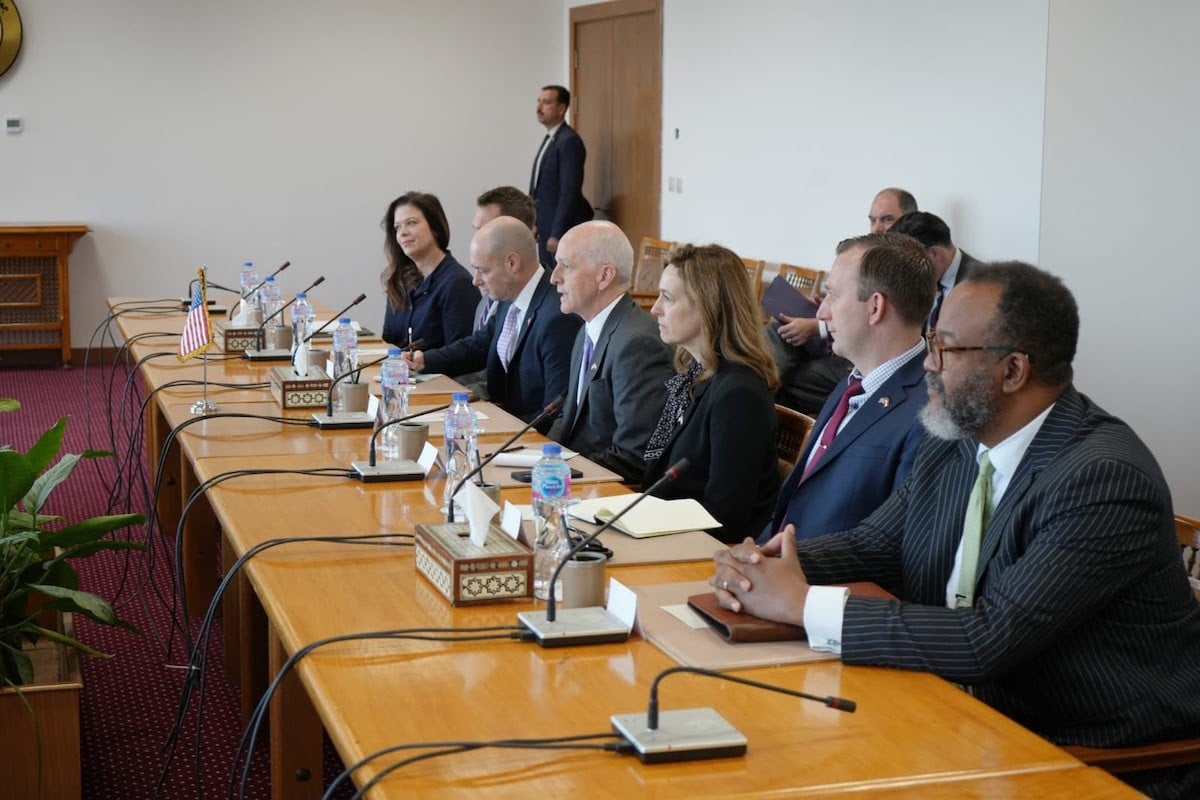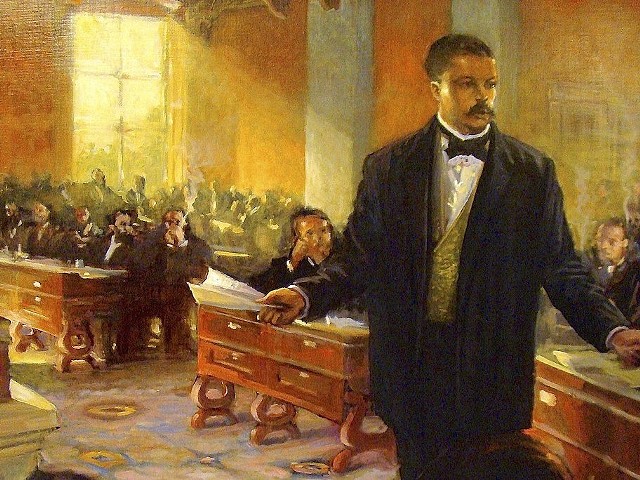Since Hamas' Oct. 7 terror attacks that killed upwards of 1,200 people in Israel, the freshman congressman has been both supportive of the Israeli government and sympathetic to the human toll in Gaza, which now creeps closer and closer to 30,000 dead, many women and children. Notably, Landsman, who is Jewish, has criticized pro-Palestinian protestors who call the actions of the Israeli government genocidal, saying anti-Zionist rhetoric is inherently antisemitic. Ultimately, Landsman tells CityBeat he wants to see hostages returned home, aid delivered to Gazans and self-governance for Palestinians to ensure lasting peace in the region, but his push for a two-state solution runs counter to the wishes of Netanyahu. As recently as Feb. 21, Israeli lawmakers voted overwhelmingly to back Netanyahu’s rejection of a Palestinian state, specifically citing international pressure to do so.
Returning Friday, Landsman told CityBeat what he learned during his trip, what points were made during his 90 minutes in the room with Netanyahu and what sort of weight a freshman congressman can bring to a room with one of the world's most powerful leaders.
This interview has been edited for length and clarity.
CityBeat: Very few members of congress have visited the Middle East since Oct. 7. Why did you choose to go?
Greg Landsman: This has had such an impact on people here, obviously, all over the world and the country, but also here in Greater Cincinnati, Southwest Ohio, the First District. We have folks here who have loved ones in Israel, we have folks here who have loved ones in Gaza. They've lost loved ones. There are Americans in Israel, there are Americans still in Gaza and there are Americans who are hostages.
I think going to a place and seeing firsthand is really important. It's why I went to the border, you get a much clearer understanding of what's happening, and who the main folks are. And that is, I think, one of the best things to do in order to have the most impact.
One of the many reasons I wanted to do public service, I remember how close Israelis and Palestinians got to a peace agreement and a two-state solution. And the huge role that American leadership played in that, the visual of President Clinton standing there with [Israeli Prime Minister Yitzhak Rabin] and [chairman of the Palestine Liberation Organization Yasser Arafat], you know, is like, forever, etched in my mind. And I think we have to get back to that place where we have U.S. leadership that is fully committed to getting to that sustained peace and a two-state solution.
CB: All eyes are on Rafah right now — how close in proximity were you?
Landsman: So we started in Cairo, met with the ministers of defense in Egypt, Jordan and Israel. And so we started in Cairo but then went out up to Rafah and got a much better understanding of the humanitarian crisis and the response that there are, you know, 150-175 trucks getting into Rafah every day, but that's not enough.
CB: What did Rafah look like? What did the situation resemble?
Landsman: On the Egyptian side, you only see trucks waiting to get in. I mean, it's just lines of trucks and fields of trucks. Every morning there is a shipment that goes in, you do not see from Rafah anything really on the Gaza side. I will say, on the Egyptian side, you are seeing the Egyptians putting in place measures to ensure that there isn't this mass exodus into Egypt, it's a serious concern for Egypt. They do take those who are seriously injured, the Egyptians, and get them to care. There are some folks who've been able to get out, we've been able to help get some folks out, I think 1,600 Americans. They believe there's about 50 Americans left in Gaza, immediate family members, so there have been folks who have been working with the State Department to get immediate family members out of Gaza. We're trying to get now an agreement for additional family members, because there's just a lot of people that have been left behind.
CB: What did you take away from visiting the border into Rafah?
Landsman: I have a much clearer sense as to what has to happen. They really only have two points of entry, they have to open additional crossings, and that is something that we spoke directly to the prime minister and the minister of defense about, how important it is to dramatically improve the humanitarian aid getting into and distributed throughout Gaza. There seems to be a recognition that that is hugely important, and that there are already plans to open additional crossings and points of entry, and setting up humanitarian corridors and humanitarian safe zones where there is the humanitarian aid that is needed: food, water, medicine, gas. They have to move faster and be clearer and more communicative on these plans, but there was more happening on that front than I had appreciated, but it has to happen faster.
CB: What stood out during your meeting with Benjamin Netanyahu? What did that room feel like?
Landsman: It's a very intense discussion. It was very serious, sobering, substantive discussion where folks were being very direct with one another. And that's the only way, I think, to handle a situation like this.
I have been in meetings with Netanyahu before. I think he is a very skilled politician, and you have to rise to the occasion if you're going to have any real impact in terms of being able to make really compelling strategic arguments. The sense he gave us was that he heard it, and he would repeat it back. Now, that could mean that that's where they are, it also could mean that he's just a very skilled politician. To me, the message has to be compelling, and you have to be disciplined, [saying] over and over [that] no one is denying Israel's need to remove Hamas from Gaza, but there has to be an end that has to come very quickly.
CB: How quickly?
Landsman: Weeks. The word weeks was repeated over and over, on both sides. And the humanitarian aid, it has to be amped up dramatically. There were, from the prime minister and others, real examples of what was happening and what is going to happen in terms of dramatically increasing humanitarian aid getting, not just into Gaza, but to the people who need it, because that is an issue.
And then that third piece, which is communicating over and over and over that there is a commitment on Palestinian self governance, and ultimately, a two-state solution. There are lots of folks who are there, a lot of Palestinians and Israelis based on polling and what I've heard who are there already, who want and are committed to a two-state solution, and [there are] a lot of Palestinians and Israelis who aren't there right now. But we have to get there.
CB: Netanyahu has been clear that he won't change his mind and support a two-state solution. Do you see there being a change in leadership in Israel in order to get to a two-state solution?
Landsman: It's up to the Israelis, right? It's a democracy, they've got to pick who they want to do all of the post-war work, you know, rebuilding in Israel. I mean, you know, there are communities that were ostensibly destroyed in terms of just the sheer number of people that were killed or taken, and there have been hundreds of thousands displaced because of what's happening in the north. And then there is this need to resolve these really big questions, not just with Palestinians, but the larger region and pulling a regional coalition together that can create the conditions for a real sustained peace and a two-state solution and to get Iran to stop funding these proxy armies, because it is destabilizing.
CB: As a member of Congress, do you think your presence in the room with Netanyahu that day carried as much weight as a meeting with someone like Biden?
Landsman: No, I mean, the president and the secretary of state and others in the administration obviously carry the most weight. I do think that I went with the armed services folks because they do carry weight and have influence, though I think it's what happens when you get in the room. How compelling can you be? And that requires, I think, a lot of research and intentionality and preparation, the discipline to be as focused and compelling as possible. And I felt very good about us delivering the right messages and doing it in a very strategic way.
Subscribe to CityBeat newsletters.
Follow us: Apple News | Google News | NewsBreak | Reddit | Instagram | Facebook | Twitter | Or sign up for our RSS Feed







